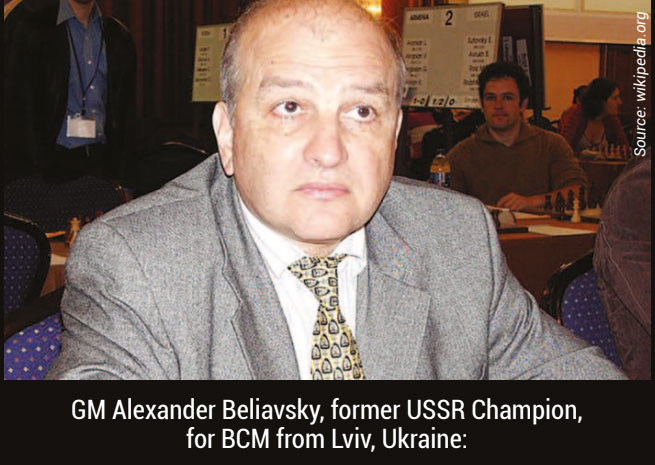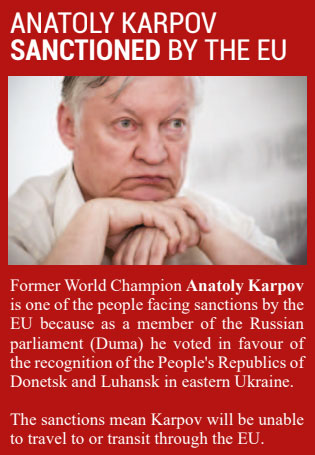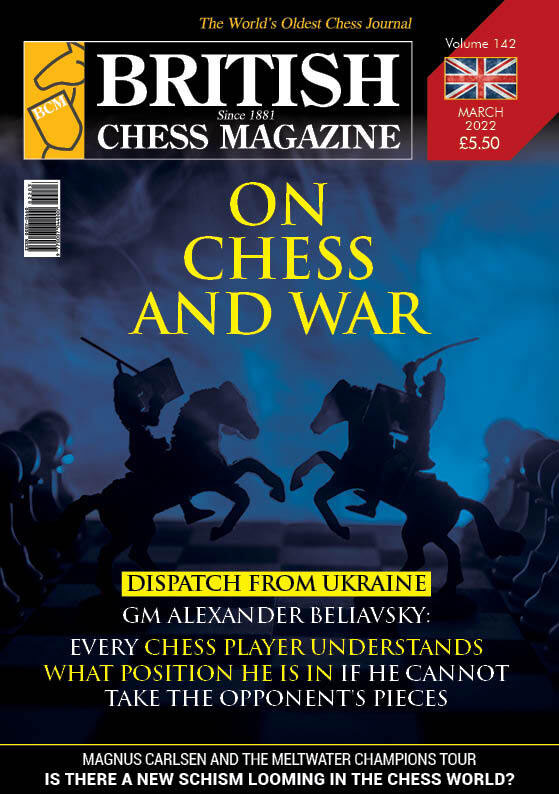Chess and war go back a long way. Its origins are in India, where in the 7th century AD a game known as chaturanga developed, which had ’four divisions (of the military)’ - infantry, cavalry, elephantry and chariotry. From this the modern-day chess pieces would evolve – the pawn, knight, bishop and rook. The game spread to Persia, the Muslim world and then to southern Europe where it evolved roughly into its current form by about 1500 AD.
However, comparing chess to war – albeit interesting and useful for making a point – is not really appropriate in practical terms. In the world of politics, PR and perception are often more important than facts. By contrast, as perceptively noted by journalist and ECF president Dominic Lawson, chess ‘is a perfect information game - each player can see on the board everything there is to know about his opponent's dispositions’.
The battles on the chessboard often produce titanic struggles of mind and character which lead to ‘great games’ and ‘beauties’ which are passionately analysed, memorised and admired. In war, as anyone who has ever experienced it will tell you, there is nothing great or beautiful. (On a personal note, I grew up in war-torn Yugoslavia and later lived under the 78-day long bombardment by NATO. I have had more than a glimpse of the realities of war.)
It would in my view certainly be extremely beneficial if, apart from adopting chess terminology, politics and politicians were to adopt the rules and principles of chess.
In war (as in love) everything is allowed and events are therefore unpredictable and often unstable; by contrast, in chess the rules are clear. Furthermore, in chess the protagonists have to abide by the same set of rules, with no exceptions. Both the world chess champion and the absolute beginner are subject to exactly the same rules, rights and obligations over the chessboard irrespective of their talents and resources. Imagine a world where, in international relations, exactly the same rules, obligations and principles applied equally to both a superpower and the weakest of countries.
The principle of ‘uniformity’ already exists in international affairs, in theory at least, as evidenced by the establishment of the United Nations. The UN represents respect for and the uniform application of the concepts of international law, sovereignty and territorial integrity. In theory at least. The harsh reality of world events however does not align with the ideals behind the creation of the UN. How many times have we seen, in recent history, the Great Powers (be they the US, NATO or Russia) effectively ignore these international rules and take aggressive military actions with terrible consequences for citizens and soldiers who find themselves on the front line.
Sadly, not only is the real world very far away from having the clear and predictable rules and certainties of chess, but it seems that we live in a time where there is incessant talk and fear of war. And fear not just of the casual metaphors of political campaigning such as a ‘war on poverty’ or ‘war on crime’, but fear of real, actual war. Constantly in the news today are Afghanistan, Syria and now Ukraine.
Chess is a game of peace, appreciated by millions around the globe who enjoy the mental stimulation it brings and the strong sense of community and fraternity it engenders. And yet, as far as I can see in the media – particularly in relation to the most recent events – the voices of the anti-war movements seem to be muted and sidelined. Instead, there is passionate, almost ardent warmongering everywhere, of course – all in the name of peace. Here let us remember the chillingly prophetic words of Stefan Zweig, author of the famous ‘Schachnovelle’ who said: ‘When they are preparing for war, those who rule by force speak most copiously about peace until they have completed the mobilization process’.
Current events in Ukraine are a terrible existential tragedy for so very many both in Russia and Ukraine, whose identities and cultures are deeply intertwined. As regards chess, Ukraine is a country where some of the greatest chess minds of all time, Russian and Ukrainian, were born and lived - David Bronstein, Mark Taimanov, Isaac Boleslavsky, Leonid Stein, Alexander Beliavsky, Vasyl Ivanchuk, Kateryna Lagno, sisters Anna and Maria Muzychuk to name but a few.
Even the peaceful world of chess is affected. Following concerns, FIDE has decided to move the 44th Chess Olympiad from Moscow to another location. In the meantime, India has sent its bid to host the event, but BCM understand that Serbia is also considering to place a bid and at least one other country. Also, all official competitions planned are to be moved from Russia. This is a big blow. Chess is almost synonymous with Russia. Also, a lot, if not most of the money for chess events comes from Russian businesses and government.
Whatever our thoughts and opinions on the matter, we in the chess community should keep in mind and act in the spirit of the motto of FIDE: ‘Gens Una Sumus’ - ‘We are one Family’. Surely, these words have never had more poignancy than in the current darkness.

Every chess player understands what position he is in if he cannot take the opponent's pieces
Let us give voice to one of the greatest masters of chess, the Soviet and Ukrainian champion Alexander Beliavsky, who kindly spoke with us from his home town of Lviv in western Ukraine. On behalf of BCM, I would like to thank Mr. Beliavsky who found the time and energy to share with our readers his thoughts through the lens of chess.
(Note: This interview was conducted just before Russia started its invasion of Ukraine.)
BCM: What has life been like for you in the past month or so? Have you been able to play any chess? Does it help you forget, at least a bit, what is happening?
Alexander Beliavsky: I spent more than a week in the hospital due to Covid complications and these worries overshadowed all other problems for a while. Due to my venerable age, I play much less frequently in tournaments compared to 40 or even 10 years ago. Chess helped me escape from reality only when I was completely absorbed in the struggle for the highest achievements. That is, in the 80s of the last century. Now, it’s different.
BCM: In chess terms, how would you describe the Ukrainian position and also the Russian position?
A.B: Russians can shoot down Ukrainian pawns and pieces, but Ukrainians cannot do the same, because of 4,500 Russian nuclear warheads. I think every chess player understands what position he is in if he cannot take the opponent's pieces.
BCM: The next chess Olympiad is supposed to take place in Moscow this summer. Do you think the Ukrainian team should participate?
A.B: The Ministry of Sports of Ukraine has not financed teams for any sporting events on the territory of Russia since 2014, when Russia seized Crimea and other Ukrainian territories. Of course, the Ukrainian Chess Federation can find private sources of funding to send a team to Russia. But I think that the federation will not do this so as not to violate the attitude of the State to this issue.
BCM: Can chess in any way help resolve this?
A.B: I don't think that chess can solve an interstate conflict because it's almost always a matter of big money. For example, Russia seized Crimea because of the huge gas deposits in the 200-mile economic zone. According to Deloitte, this is about 766.6 billion cubic meters of gas and 232.6 million tons of oil and condensate. The cost of gas alone at the current price of $1,000 per 1,000 cubic meters is $766 billion.
This is a lot of money even for the United Kingdom. For Ukraine, this is almost twenty years of government budget revenue.
BCM: What would your message be to the readers in the UK?
A.B: I wish all readers of BCM exciting fighting exclusively on the chessboard.
How the chessworld reacted to the war in Ukraine
By Milan Dinic
Chess professionals weigh in on the conflict, with some calling for a ban on Russian players
The decision of Russia to go to war in Ukraine prompted chess players to voice their opinions. While many condemned Russian actions, some supported them and some just reflected on the tragedy of war.
In its reaction to the events, the International chess federation, FIDE, has decided to move all relevant competitions from Russia, including the Chess Olympiad which was due to take place in Moscow this summer. FIDE is likely to find itself under financial pressure as well given that it relies on the support of Russian state companies such as the energy giant Gazprom.
World Champion Magnus Carlsen’s PlayMagnus group released a statement saying they are ‘devastated’ by the events in Ukraine and have voiced their support for the Ukrainian people. Carlsen later tweeted the statement with a brief comment: "Peace is cool. War - not so much".
Former world champion, Garry Kasparov – who has for years been a staunched critic of Russia (and FIDE’s president Arkady Dvorkovich, who was once Russia’s deputy PM), was among the first to react with a barrage of tweets calling for international action. GM Peter Heine Nielsen called for the chessworld to ‘show solidarity with Ukraine’ while the former contender for the title of world champion, Ian Nepomniachtchi has said the world should say no to war.
 Some went further, such as Jacob Aagaard, the Danish-born Scottish GM, who called on abandoning all ties with Russian chess sponsors, removing Russian players from the World Championship cycle and banning Russians from all international competitions.
Some went further, such as Jacob Aagaard, the Danish-born Scottish GM, who called on abandoning all ties with Russian chess sponsors, removing Russian players from the World Championship cycle and banning Russians from all international competitions.
Nigel Short, the current vice-president of FIDE has described the Russian invasion of Ukraine as ‘the most appalling act of aggression against a sovereign nation’.
On the other hand, some showed sympathy for Russia’s actions, such as the Crimean born Russian GM and former contender for the title of world champion, Sergey Karjakin. Russian GM Sergei Shipov justified Russia’s actions, citing concerns about Russians in the east of Ukraine.
Some were more neutral such as the Indian GM Vidit Gujrati who just posted a tweet saying: “Tragic & inhumane”.
At the time of writing, the morning of 25th February, the world champion, Magnus Carlsen, remained silent on the issue.

Milan Dinić
Currently based in London, Milan works on social and political research for the global market research company YouGov and is an assistant for new projects for the founder and CEO of YouGov Stephan Shakespeare. For a number of years he has been working as a journalist and editor for various media, mostly print and internet in Serbia and the Balkans and has published in both daily and weekly newspapers. He worked for the FOX TV Network in Serbia as a reporter, and has also worked as a researcher, fixer and translator for The Guardian, where he has published several articles, as well as other international media.

Milan also edits the British Chess Magazine, the world's oldest chess publication.
The British Chess Magazine contains 64 pages packed with exclusive articles and annotations. You can buy a subscription (£55 per year, £4.58 per issue) or download a sample copy free.
Social media tags:
- BCM @BCMchess
- Milan Dinić: MilanDinic1
BCM will continue to follow the events in Ukraine and how they impact the chess world.
There have been some major developments since this issue of the magazine appeared on 1st March, 2022.
- Now that the Chess Olympiad initially scheduled to take place in Russia has been cancelled by the FIDE, India would be hosting the event in Chennai.
- A large number of prominent Russian chess players have made an appeal to Vladimir Putin, the President of Russia, calling for a ceasefire and peace in Ukraine.
- As for Carlsen, his first response was low-key, a tweet, “Peace is cool, war not so much.” Then there was a stronger follow up on 25th February (the day after the war had begun) by Play Magnus Group with the following message: “We are devastated by the Russian invasion of Ukraine. As a global organization serving millions of chess fans around the world with staff from both Russia and Ukraine, we are concerned for our people and the wider chess community, and we strongly condemn these attacks. We believe that sports, and chess in particular, can play a significant role in offering unity by bringing people to the table, physically, virtually, and metaphorically. Our thoughts are with the people of Ukraine.”
- As is known, Carlsen is now playing in the Charity Cup for UNICEF to support children and their families within or fleeing Ukraine. The event is organized by the Meltwater Champions Chess Tour.
.jpeg)


















 Some went further, such as Jacob Aagaard, the Danish-born Scottish GM, who called on abandoning all ties with Russian chess sponsors, removing Russian players from the World Championship cycle and banning Russians from all international competitions.
Some went further, such as Jacob Aagaard, the Danish-born Scottish GM, who called on abandoning all ties with Russian chess sponsors, removing Russian players from the World Championship cycle and banning Russians from all international competitions.






